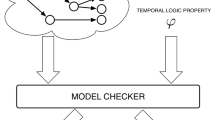Abstract
We deal with logical approaches to knowledge acquisition in multi-agent systems. We enhance previous work by considering the inductive card game Eleusis where dynamic knowledge about the behavior of other agents or environment, rather than traditional static knowledge about system states is acquired. Our main contributions are as follows: (1) we formalize the knowledge acquisition process in the infinite version of the Eleusis game with perfect recall (i.e., the agents never forget the acquired information), using the propositional logic of knowledge and branching time Act-CTL-K\(_n\), and (2) we formally prove that the Eleusis system with perfect recall is well structured, which in practice enables applying the recently implemented model checking methods for infinite well-structured systems. In addition to the theoretical interest, our work is also motivated by potential application fields, including cryptography.
Similar content being viewed by others
Data availability
There is no data used in this manuscript.
Notes
In the definition, for every set S, let \(S^*\) be the set of all finite sequences over S and the operation \(^\wedge\) stand for the concatenation of finite words.
Because we model behavior depending on information history, but not on the single local state.
Our formal description of Eleusis can easily be extended to a larger number of players: we just need to add the corresponding player names to the model and define their actions and protocols in the manner described below, down to the player names.
We do not need in future F because Eleusis rule determines all cards in sequences at every position step by step.
References
Abdulla P.A., Ĉerâns K., Jonsson B., and Tsay Yih-Kuen. Algorithmic analysis of programs with well quasi-ordered domains. Information and Computation, v.160 (1-2), 2000, p. 109-127.
Clarke, E.M., Henzinger, T.A., Veith, H. Handbook of Model Checking. Springer International Publishing (2018).
Dietterich T. Applying General Induction Methods to the Card Game Eleusis // Proc. of the 1st Annual National Conference on Artificial Intelligence. Stanford University, August 18-21, 1980. AAAI Press/MIT Press, 1980, P. 218-220.
van Ditmarsch H., Kooi B.. One Hundred Prisoners and a Light Bulb. Springer International Publishing (2015).
Dworzanski L.V., Mikhaylov V.E. Tool for Behavioral Analysis of Well-Structured Transition Systems. Proceedings of the Institute for System Programming of the RAS (Proceedings of ISP RAS). 2017;29(4):175-190. https://doi.org/10.15514/ISPRAS-2017-29(4)-11
Fagin R., Halpern J.Y., Moses Y., Vardi M.Y. Reasoning about Knowledge. MIT Press, 1995.
Finkel A., Schnoebelen Ph. Well-structured transition systems everywhere! Theor. Comp. Sci., v.256(1-2), 2001, p.63-92.
Garanina N.O. Common knowledge in well-structured perfect recall systems.// Aut. Control Comp. Sci. 48, 381–388 (2014). https://doi.org/10.3103/S0146411614070086
Garanina N.O. Eleusis: Perfect Recall for Inductive Reasoning // Computing, Telecommunications and Control Systems #1(188), 69–75 (2014).
Gardner M. The Second Scientific American Book of Mathematical Puzzles and Diversions. University of Chicago Press Edition, 1987. 251 p.
M. Kacprzak, A. Lomuscio and W. Penczek Verification of Multiagent Systems via Unbounded Model Checking. // Proceedings of the Third International Joint Conference on Autonomous Agents and Multiagent Systems (AAMAS ’04) — 2004. — Vol. 2. — P. 638– 645.
Kol, G., Naor, M. Cryptography and Game Theory: Designing Protocols for Exchanging Information. // In: Canetti, R. (eds) Theory of Cryptography. TCC 2008. Lecture Notes in Computer Science, vol 4948. Springer, Berlin, Heidelberg. https://doi.org/10.1007/978-3-540-78524-8_18
Kurzen L. Eleusis: Complexity and Interaction in Inductive Inference. In Xabier Arrazola and Maria Ponte (eds.) Proceedings of the Second ILCLI International Workshop on Logic and Philosophy of Knowledge, Communication and Action, LogKCA-10, Donostia - San Sebastian, Spain, November 3-5, 2010. The University of the Basque Country Press, 2010.
A. R. Lomuscio, R. Van Der Meyden, M. Ryan. Knowledge in Multiagent Systems: Initial Configurations and Broadcast. ACM Transactions on Computational Logic (TOCL), 2000. Vol. 1, N. 2. p. 247-284.
van der Meyden R., Su K. Symbolic Model Checking the Knowledge of the Dining Cryptographers. Proceedings of the 17th IEEE workshop on Computer Security Foundations, 2004, p. 280-291.
Mizuki, T. Preface: Special Issue on Card-Based Cryptography. New Gener. Comput. 39, 1–2 (2021). https://doi.org/10.1007/s00354-021-00127-1
De Raedt L. and Van Laer W. Inductive Constraint Logic // Proceedings of 6th International Conference Algorithmic Learning Theory, ALT ’95, Fukuoka, Japan, October 18-20, 1995, Springer, Lecture Notes in Computer Science, Vol. 997, 1995, p. 80-94.
Shilov N.V. and Yi K. How to find a coin: propositional program logics made easy. In: Current Trends in Theoretical Computer Science, World Scientific, v. 2, 2004, p.181-213.
Shilov N.V., Garanina N.O., and Choe K.-M. Update and Abstraction in Model Checking of Knowledge and Branching Time. Fundamenta Informaticae, v.72, n.1-3, 2006, p.347-361.
Shilov N.V., Garanina N.O. Combining Knowledge And Fixpoints // Preprint — Novosibirsk, 2002. — N. 98. — 50 p.
Shilov N., Garanina N. and Bodin E. Multiagent approach to a Dijkstra problem. — In Proceedings of Workshop on Concurrency, Specification and Programming CS &P’2010 (Helenenau, September 27 – 29, 2010). — Humboldt-Universitat zu Berlin. Informatik-Bericht Nr.237, v.1, p.73–84.
Acknowledgements
We thank the referees for their careful reading and editing of the paper. We also thank the editing service of the journal for the good improvements and the organization of the paper.
Funding
Natalia Garanina was supported by the scholarship of DAAD (German Academic Exchange Service). Sergei Gorlatch is supported by the DFG project Nr. 470527619 (PPP-DL) at the University of Munster.
Author information
Authors and Affiliations
Corresponding author
Ethics declarations
Conflict of interest
The authors declare no competing interests.
Additional information
Publisher's Note
Springer Nature remains neutral with regard to jurisdictional claims in published maps and institutional affiliations.
Rights and permissions
Springer Nature or its licensor (e.g. a society or other partner) holds exclusive rights to this article under a publishing agreement with the author(s) or other rightsholder(s); author self-archiving of the accepted manuscript version of this article is solely governed by the terms of such publishing agreement and applicable law.
About this article
Cite this article
Garanina, N., Gorlatch, S. KNOWLEDGE ACQUISITION IN MULTI-AGENT SYSTEMS: A FORMALIZATION OF THE ELEUSIS CARD GAME. J Math Sci (2024). https://doi.org/10.1007/s10958-024-07107-y
Accepted:
Published:
DOI: https://doi.org/10.1007/s10958-024-07107-y




